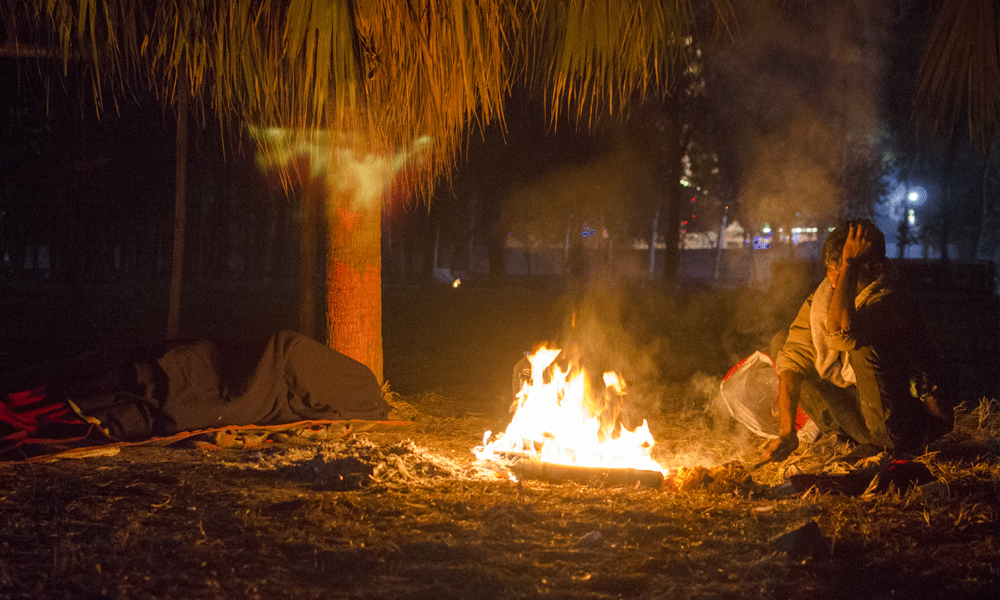
A homeless person lights a fire under a tree to stay warm while another rests nearby, wrapped in blankets, highlighting the struggle to endure harsh winter conditions. The photo was taken in the capital’s Suhrawardy Udyan on Saturday. Photo : Muktadir Mokto
Among all seasons in Bangladesh, winter most starkly highlights the discrimination and inequality entrenched in our society. For many, the season heralds weddings, picnics, reunions, fashionable warm clothes, and various types of pithas (cakes). For the poor, however, it is a frozen hell, as their suffering knows no bounds in the bone-chilling cold.
The ongoing cold wave has caused a sharp drop in temperature, accompanied by dense fog at night, making life unbearable for those at the lower rungs of society – particularly rickshaw pullers, day labourers, street children, and deserted elderly individuals who sleep under the open sky.
During visits to train and bus stations, markets, parks, foot overbridges, and pavements in the capital at midnight, this correspondent observed many homeless individuals shivering in the cold.
Winter has turned unforgivingly harsh for them, forcing them to endure long foggy nights without warm clothes to shield themselves from the biting chill.
At Suhrawardy Udyan, around 20 homeless people were found sleeping under the open sky. One of them, Firoz Mia, clad in torn clothes, suddenly awoke and began gathering leaves and straw to light a fire to warm himself.
When approached, the 30-year-old day labourer said, “I have been trying to sleep for the last hour, but the severe cold and wind have disrupted my rest as I don’t have enough winter clothes. Now I’ve gathered these leaves and straws to light a fire. If I huddle around it, it might comfort me a bit and help me sleep.”
At Farmgate foot overbridge, a woman and her one-year-old child were found sleeping, dressed in a torn cardigan and a thin, worn-out sweater. Hugging her baby, the unfortunate mother tried to share warmth.
Next to her, a septuagenarian woman, Hazera Bibi, was resting. Wrapped in a mosquito net and quilt, she struggled to protect herself from the biting cold.
“I am alone and helpless. I get something to eat only if someone gives me food. Otherwise, I starve. The icy wind of winter has made life unbearable for poor people like us,” she said.
Kamalapur Railway Station hosts a large number of homeless individuals each night. Some were seen seeking permission from guards to sleep inside an abandoned railway coach for protection from the cold.
Shofikul Islam, a middle-aged seller of mineral water and juice at the station, shared his struggles, “The excessive cold has gripped Dhaka over the past two days. I’ve managed so far with my sweatshirt and quilt, but now it feels like these are not enough if I want to stay well and keep running my business tomorrow.”
The Ministry of Social Welfare’s Additional Secretary (Planning, Development, and Law) Nargis Khanam and Additional Secretary (Institutions and Disability) Bijoy Krishna Debnath admitted that they could not ascertain the actual number of homeless individuals in Dhaka.
According to the 2022 Population and Housing Census, there are 10,000 homeless people in Dhaka. However, a 2023 study by the Institute of Social Welfare and Research estimated the number to be 50,000, although experts working with the underprivileged suggest the figure is significantly higher.
While these individuals contribute substantially to the economy through physical labour, they are forced to make difficult choices during winter. Many shared that if they buy warm clothes, they will have nothing to eat.
Efforts to understand the government’s plans to alleviate their plight were futile as Social Welfare Adviser Sharmeen S Murshid and Secretary Dr Md Mohiuddin were unavailable for comment.
Senior officials from the ministry, speaking anonymously, claimed that the government is distributing blankets to cold-hit poor people across the country. However, many destitute individuals complained that the assistance was insufficient to protect them from the harsh cold.
Rights activists suggested that the government could set up tents in open spaces to shelter low-income homeless individuals for a token fee, following practices in other countries. They emphasised the need for greater support from both the government and affluent members of society to alleviate the suffering of these underprivileged people.
Dr Mizanur Rahman, former chairman of the National Human Rights Commission Bangladesh, said, “The government must take measures to protect poor people from extreme cold. Additionally, the wealthier sections of society should stand by them. Otherwise, it will be difficult for poor people to survive.”


